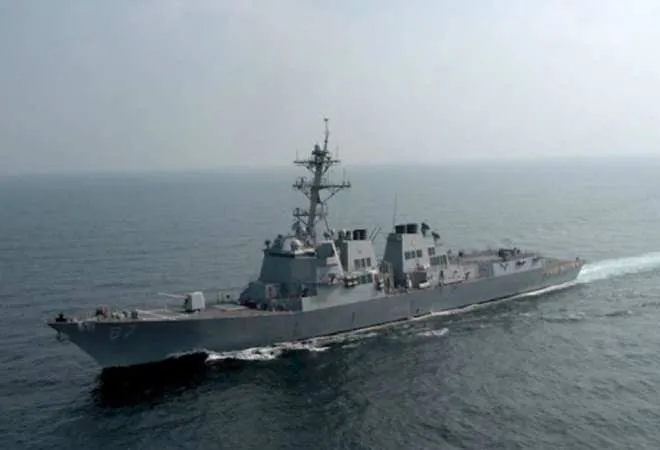-
CENTRES
Progammes & Centres
Location
This has been a longstanding policy of China, but more recently, Beijing has been perturbed by New Delhi’s proactive push in China’s periphery along the wider Indo-Pacific. Beijing is attempting to portray itself as the new leader in the emerging multipolar world

Essentially, China has attempted to maintain its presence in IOR through various means. Beijing has cultivated close and personal relationships with political elites and parties of IOR countries, usually through corruption, party funding, and by turning a blind eye to their human rights abuses and democratic infirmities; friendship with different political parties in Pakistan; bonhomie with the Rajapaksa clan in Sri Lanka, and close relations with Maldives’ Abdulla Yameen and the Progressive Party of Maldives (PPM) are some examples of this widespread phenomenon. In addition, China has often used the elite capture tactic to ensure a pro-China policy and bag geo-economically and strategically significant projects. This includes concessions on Pakistan’s Gwadar port and Sri Lanka’s Colombo Port City project. Economic investments and assistance have been vital to China’s Indian Ocean strategy too. With its economic boom, the country has developed and funded infrastructure projects in IOR countries, often with fewer conditions and less regard for their political and economic situation, thus making it an attractive partner for several developing economies. However, this assistance is usually unaccounted for and opaque, and exploits and exacerbates the structural vulnerabilities of the host countries. Over the past decade, such Chinese investments have surged in Pakistan, Sri Lanka, Djibouti, Maldives, Seychelles, and other developing African countries. However, the lack of accountability and reforms has increased the number of white elephant projects and their debt accumulation. Sri Lanka is still not out of its economic crisis, Pakistan is on the brink of an economic collapse, Somalia is reportedly approaching the International Monetary Fund, Kenya is requesting China for an extension of its repayment period, and Djibouti’s debts to China are worth nearly half of its gross domestic product. Unable to repay these debts, most of these countries have heeded Chinese pressure and toed the line on its interests. This has created a strong military leverage for China. Today, Djibouti hosts a Chinese military base; Sri Lanka has leased its Hambantota port to China for 99 years, and Pakistan’s Gwadar port project permits China to access the Indian Ocean. Unsurprisingly, most IOR countries have also hosted Chinese submarines and vessels due to Chinese coercion and pressure--jeopardising the security of other regional powers. The docking of the Chinese spy ship Yuan-Wang 5 in Sri Lanka is the latest example of this coercion.China’s ambitions in the Indian Ocean have been motivated by three factors. Primarily, as the new world order unveils around the Indo-Pacific, Beijing aims to challenge other major powers, such as India, and establish its hegemony.
China has embraced various means to entrench its presence and influence in the IOR. The latest Indian Ocean Forum is another way to challenge Indian influence and presence in the Indian Ocean. This is not China's first attempt to corner India in its backyard. With the onset of Covid-19, Beijing has shaped multiple initiatives with other South Asian nations, excluding India, and has attempted to institutionalise them. These initiatives have focussed on post-pandemic recovery, enhancing connectivity, emergency supplies reserve, poverty alleviation, and e-commerce cooperation. Through these developments, Beijing is signalling that the Indian Ocean is no longer India’s Ocean, and South Asia is no longer India’s sphere of influence. This has been a longstanding policy of China but more recently, Beijing has been perturbed by New Delhi's pro-active push in China's periphery along the wider Indo-Pacific. Beijing is attempting to portray itself as the new leader in the emerging multipolar world. Having invested in bilateral relationships with IOR countries, Beijing is now institutionalising its presence and assistance in the region. A significant hurdle, however, is the growing trust deficit when it comes to China. Beijing’s resistance to loan restructuring, debt-trap diplomacy, and use of coercion to further its national and military interests have only furthered this sentiment. China’s lack of assistance to Sri Lanka, despite being its largest lender, has only furthered these reservations on the part of the former. More significant, perhaps, is India’s central role in the region and for regional actors. In theory, New Delhi can be marginalised, but in practice, the success of any future institutional architecture would have to consider to what extent IOR countries would be able to ignore India’s strategic interests and concerns.Having invested in bilateral relationships with IOR countries, Beijing is now institutionalising its presence and assistance in the region.
The views expressed above belong to the author(s). ORF research and analyses now available on Telegram! Click here to access our curated content — blogs, longforms and interviews.

Aditya Gowdara Shivamurthy is an Associate Fellow with the Strategic Studies Programme’s Neighbourhood Studies Initiative. He focuses on strategic and security-related developments in the South Asian ...
Read More +
Professor Harsh V. Pant is Vice President – Studies and Foreign Policy at Observer Research Foundation, New Delhi. He is a Professor of International Relations ...
Read More +